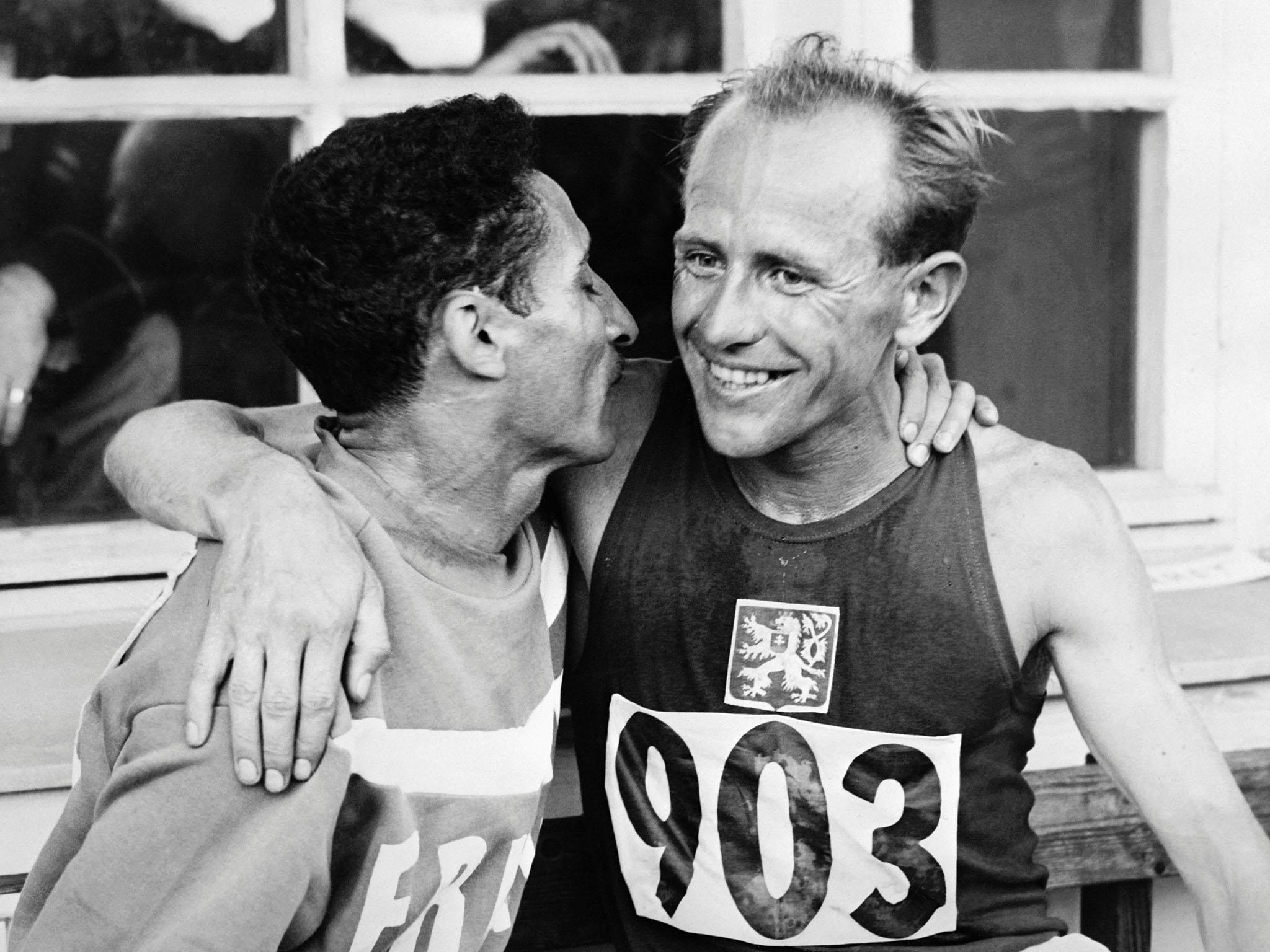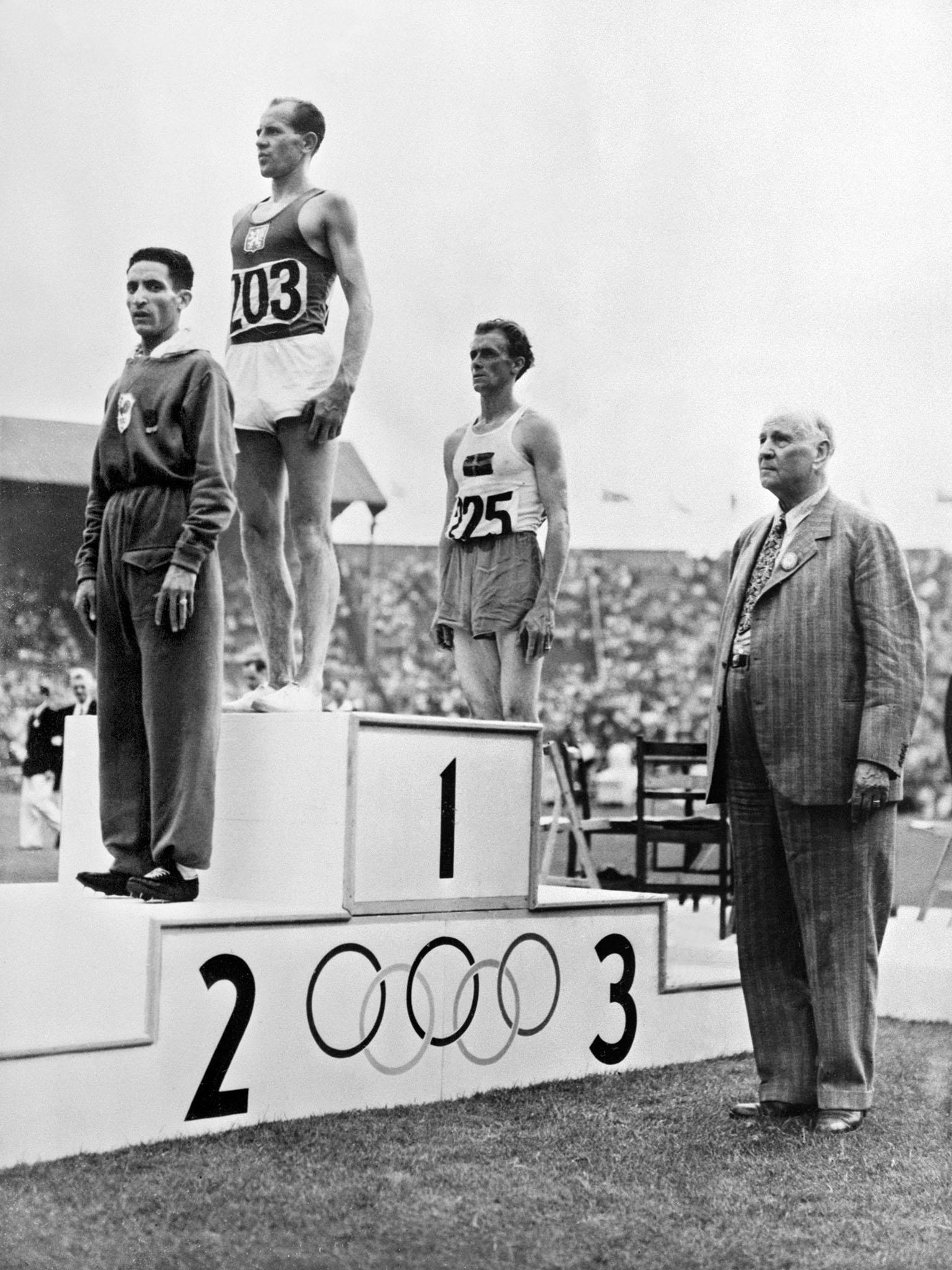Great Olympic Friendships: Alain Mimoun, Emil Zatopek and the day that friendship trumped victory
In a Zatopek-free world, Mimoun would have been a multiple champion, celebrated the world over

Your support helps us to tell the story
From reproductive rights to climate change to Big Tech, The Independent is on the ground when the story is developing. Whether it's investigating the financials of Elon Musk's pro-Trump PAC or producing our latest documentary, 'The A Word', which shines a light on the American women fighting for reproductive rights, we know how important it is to parse out the facts from the messaging.
At such a critical moment in US history, we need reporters on the ground. Your donation allows us to keep sending journalists to speak to both sides of the story.
The Independent is trusted by Americans across the entire political spectrum. And unlike many other quality news outlets, we choose not to lock Americans out of our reporting and analysis with paywalls. We believe quality journalism should be available to everyone, paid for by those who can afford it.
Your support makes all the difference.Emil Zátopek, who in eight miraculous days in Helsinki in 1952 won an unprecedented, never-to-be-repeated clean sweep of Olympic distance-running golds (5,000m, 10,000m, marathon), was as famous for his good nature as for his dominance on the track. Rivals from all over the world became close, lifelong friends: Gordon Pirie and John Disley in the UK, Gaston Reiff in Belgium, Herbert Schade in West Germany, Les Perry and Dave Stevens in Australia, Fred Wilt and John J Kelley in the US – to name just a few.
But the warmest of all the friendships he forged as an athlete was that with the Frenchman who became known as Zátopek’s “shadow”.
When Zátopek won the 10,000m in London in 1948, Alain Mimoun, nearly a lap behind, won silver. When Zátopek won the 5,000m and 10,000m in the European championships in Brussels in 1950, Mimoun, a little closer this time, took the silvers. In Helsinki, it was exactly the same, except that the gap narrowed further: Mimoun took silver at 5,000m and 10,000m.
In a Zátopek-free world, Mimoun would have been a multiple champion, celebrated the world over. Instead, between races he scraped a living in a cafe as a waiter, living for years in a tiny apartment without heating, shower or toilet.
You might have expected him to resent the invincible Czechoslovak. Instead, he worshipped him. Not only did Zátopek keep dragging him to faster times – Mimoun knocked more than 14 seconds off his personal best when coming second in the 5,000m in Helsinki – but he treated the Algerian-born Mimoun with a warmth and respect that he encountered all too rarely in France.
The two men first met in 1947 and quickly bonded. Zátopek was a career soldier; Mimoun had fought (and been wounded) in the Second World War. Both loved wine and women. Later, when Zátopek had settled down but Mimoun’s personal life remained somewhat chaotic, the Frenchman became a regular visitor to the Zatopek home (which Gordon Pirie described as “the gayest and merriest home I have ever visited”).
In footage from Helsinki, you can see the warmth of the two men’s friendship in the way they embrace after Emil’s victories. But perhaps the most memorable moment of their relationship came at the Melbourne Olympics in 1956, when Mimoun, for the first and only time, turned the tables.
Zátopek was past his peak by then, and not fully recovered from injury. None the less, when he, Mimoun and 44 others assembled at the starting-line for the marathon – the last Olympic race that either man would ever run – most people, including Mimoun, anticipated yet another Zátopek triumph.
It was blazing hot: reported temperatures ranged from 30C to 35C. Just before the start, Zátopek famously uttered words that are usually quoted as “Men, today we die a little.” He was not far wrong.
Mimoun stuck, as usual, to Zátopek’s heels. But within a few miles the Czechoslovak realised that he was struggling – not least because the glue in his shoes was melting in the heat, causing his feet to slip around agonisingly. Anxious not to spoil his friend’s chances, Zátopek repeatedly urged Mimoun to leave him behind; eventually, the Frenchman was persuaded. He went on to achieve the greatest victory of his life, winning by a margin of 1 minute 32 seconds. Then, while 110,000 spectators roared their acclaim, Mimoun remained anxiously at the side of the track. “I wanted to see where my buddy came,” he explained later.
One by one, the other runners staggered in. Mimoun clapped them all home, but he was still watching anxiously. Where was Zátopek?

Finally, four minutes 34 seconds behind, Zátopek entered the stadium, in sixth place. He completed the final lap to a deafening ovation, even attempting a sprint on the final straight. Then he slumped by the side of the track, seemingly more dead than alive.
Mimoun rushed over. “Emil, congratulate me,” he said. “I am an Olympic champion.” After all those years as Emil’s shadow, he was a winner in his own right. “Emil turned and looked at me,” Mimoun recalled towards the end of his life, “as if he were waking from a dream.” Then Zátopek struggled to his feet, took two steps backward, “snapped to attention”, took off the cap he had been wearing to protect against the sun, and – “a good military man” – saluted him.
Next, delightedly, he embraced his victorious friend. When you see pictures of that moment it is hard to doubt Mimoun’s assertion that “he was as proud as if he had won himself” – or to doubt Mimoun’s subsequent claim that “for me, that was better than a medal”.
There is an old Olympic saying that is often attributed to Zátopek: “Great is the victory, but greater still is the friendship.” In those post-race race moments in Melbourne, you can see precisely what those words mean.
Zátopek and Mimoun remained close until the former’s death in November 2000. “I have not lost a friend,” said Mimoun when he heard the news. “I have lost a brother.”
=
Richard Askwith is author of “Today We Die A Little: the Rise and Fall of Emil Zátopek, Olympic Legend” (Yellow Jersey, £16.99).
Join our commenting forum
Join thought-provoking conversations, follow other Independent readers and see their replies
Comments